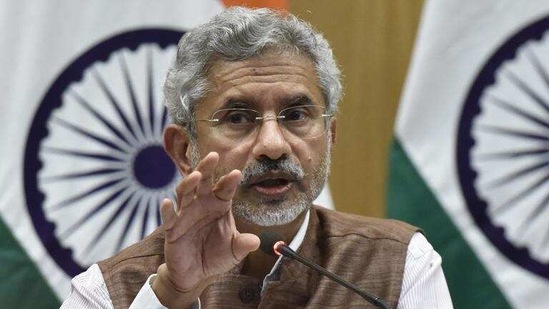‘Peace on LAC must to mend ties’: Jaishankar tells Chinese counterpart
EAM Jaishankar’s blunt message was conveyed to his Chinese counterpart Wang Yi during a 75-minute phone conversation on Thursday — the first formal contact between the two ministers since they met on the margins of a Shanghai Cooperation Organisation (SCO) meeting in Moscow last September.
External affairs minister S Jaishankar has told his Chinese counterpart Wang Yi that bilateral ties can only be repaired by maintaining peace and tranquillity in border areas and completing the disengagement of frontline troops at all friction points on the Line of Actual Control (LAC).

Jaishankar’s blunt message was conveyed to Wang during a 75-minute phone conversation on Thursday — the first formal contact between the two ministers since they met on the margins of a Shanghai Cooperation Organisation (SCO) meeting in Moscow last September.
The continuing differences between the two sides were evident in the Chinese foreign ministry’s readout of the conversation, which quoted Wang as saying that the boundary dispute is “an objective fact” but it wasn’t the “whole of China-India relations” and should be put in a “proper place in the overall bilateral relations”. This was perceived as the Chinese side’s keenness to take forward ties in other areas such as trade while setting aside the standoff.
The two ministers also agreed to establish a hotline to facilitate timely communications and exchange of views.
The conversation came days after India and China pulled back frontline troops from strategic heights around Pangong Lake along with armoured vehicles and artillery last week, and Jaishankar said it is necessary for the two sides to “quickly resolve the remaining issues along the LAC in eastern Ladakh”.
“It was necessary to disengage at all friction points in order to contemplate de-escalation of forces in this [Ladakh] sector. That alone will lead to the restoration of peace and tranquillity and provide conditions for progress of our bilateral relationship,” Jaishankar was quoted as saying in a statement issued by the external affairs ministry.
He added that once disengagement is completed at all friction points, the two sides “could look at broader de-escalation of troops in the area”. Jaishankar noted that both countries had always agreed that maintaining peace and tranquillity in the border areas was “essential basis for development of bilateral relations”, and a “prolongation of the existing situation was not in the interest of either side”.
A senior South Block official, who didn’t want to be named said: “Normalcy and a border dispute cannot run in parallel as Beijing wants. China has not told India why it attempted to change the status quo at Pangong Tso in May 2020 and why it withdrew 10 months later.”
Jaishankar, the official added, presented his diagnosis of the hurdles to resumption of normal bilateral ties to Wang, and the steps needed to turn back the clock.
Indian and Chinese military commanders held the 10th round of talks on February 20, which lasted a marathon 16 hours, to discuss disengagement at other friction points such as Depsang, Hot Springs and Gogra. However, there hasn’t been any announcement on extending disengagement to other sectors.
The Indian statement said Jaishankar reminded Wang of their conversation in Moscow last September, when the Indian side expressed concern over “provocative behaviour and unilateral attempts of the Chinese side to alter status quo”. Jaishankar noted bilateral ties have been “impacted severely”, and the boundary question may take time to resolve but “disturbance of peace and tranquillity including by violence, will inevitably have a damaging impact on the relationship”.
He added the two sides also decided in Moscow that border troops should quickly disengage and ease tensions.
According to the Chinese readout, Wang described boundary disputes as an “objective fact” that should be taken seriously, but he said this isn’t “the whole of China-India relations, and it should be put at a proper place in the overall bilateral relations”.
China and India, Wang said, should “work together for shared progress rather than erecting walls against each other”, and suggested the two sides can “begin from easier things and proceed incrementally so as to build enabling conditions for a better relationship and greater practical cooperation”.
Wang also said the two sides should commit to the consensus reached by their leaders and “handle the boundary question properly to prevent the bilateral relationship from sinking into a negative cycle”.
The Chinese readout was silent on addressing the other friction points, and Wang only said the ground situation had noticeably eased after disengagement at Pangong Lake. “It is imperative for the two sides to cherish the hard-won relaxation, and work together to consolidate the progress, keep up the consultation momentum, further ease the situation, and improve the border management and control mechanisms,” Wang said.
Wang also sought to again blame India for the standoff at the LAC. He said: “There has been some wavering and back-pedalling in India’s China policy, and practical cooperation between the two countries has been affected.”
The Indian statement said Wang noted the Indian side’s proposal of “three mutuals” — mutual respect, mutual sensitivity and mutual interests — as the approach to the relationship, and that he agreed on the “importance of taking the long view of our ties”.
Sameer Patil, fellow for international security studies at Gateway House, said the disengagement at Pangong Lake has created hope for giving momentum to de-escalation at other friction points. “The Indian side wants to strike while the iron is hot and get the disengagement at other places. We need to keep the focus on this issue, and that’s reflected in the external affairs minister’s remarks. India can’t allow any diversions or give any leeway to the other side,” he said.
Get Current Updates on India News, Ram Navami Live Updates , Lok Sabha Election 2024 live, Elections 2024, Election 2024 Date along with Latest News and Top Headlines from India and around the world.





